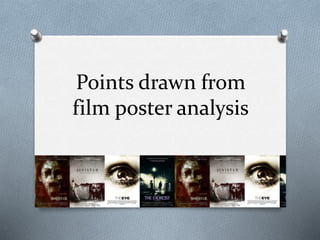Points from poster analysis
- 1. Points drawn from film poster analysis
- 2. Through the analysis of three horror film posters I have gathered sufficient information to gain a wider understanding of the codes and conventions of a horror film poster. Below are the main aspects I took note of:
- 3. Film posters are used to advertise and inform audiences of a new film. Therefore all posters should use Bulmer and Katz theory of Uses and gratifications by consuming the poster as ‘information’ as to the title of the new film and release date. Other information can also include film ratings, institutions website, small print information about the production company or any other institutions associated with the film etc. Institutional information is usually presented on posters of high-budget films.
- 4. Secondly, From my research I found that posters will generally use an establishing shot of a main location from within the film, or a close up/mid shot of the main protagonist(s) and their facial expressions As the main image. This enables audiences to have a clear view of the characters and/or their surroundings in addition to the type of film which is being advertised.
- 5. Posters are generally constructed with a higher image to text ratio. Although text is needed to inform audiences with information such as the film title and release date. Most codes and conventions should be clear to see within the image itself as well as adhering to the horror genre in order to attract audiences.
- 6. Whatever the colour the background the font colour and size used must stand out for it to be read clearly by consumers. Font size varies on a poster. The title of the film is usually seen in the largest font size on the page in order to stand out amongst the other text…
- 7. …The second largest would be the release date, as for audiences wanting to watch the film the release date is a crucial piece of information. The type of Font style used on a poster is also very significant. Font can signify what genre the film is and also what the film may be about.
- 8. The release date of the film is generally presented at the bottom of the poster to stay in the minds of the consumers as its the last thing they will see. Being placed at the bottom of the poster also suggests its not a particularly seasonal such as Halloween, Winter or Summer. Whereas if the release date was to be at an exciting time of year then it is likely that the release date would be an additional focus point of the poster.
- 9. Whilst the main image and film title are used to appeal to the audience taglines are used to sell the product with context in hope to persuade and interest the audience into watching the film. Taglines generally are only a few words, short sentence or rhetorical question directed at the audience for enticement.









